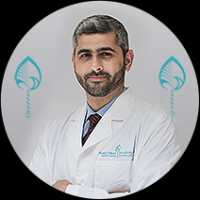
12 Apr Epilepsy: Genetic Testing Should Include Parental Sampling
MedicalResearch.com Interview with:
Dr. Ahmad Abou Tayoun, PhD
Clinical Molecular Geneticist
Director of the Genetics Laboratory
Al Jalila Children’s
United Arab Emirates
MedicalResearch.com: What is the background for this study?
Response: In this study, we provide data in favor of using an exome-based testing approach, where parental samples can be readily accessible, for early onset epilepsy patients. The exome test includes all coding genes in the human genome. Although we perform exome sequencing on those patients, we demonstrate that a first tier analysis should include targeted interpretation of ~100 genes strongly associated with the disease. This analysis provides diagnoses in ~11% of the patients. Follow up parental testing on a limited number of patients (n=15) that had inconclusive results, revealed de novo (new mutations) variant status, leading to upgrade to positive reports in 7 patients and adding ~5% to the overall diagnostic yield.
MedicalResearch.com: What are the main findings?
Response: Because we use an exome backbone, reflexing to whole exome sequencing (to interrogate other than the 100 epilepsy genes) becomes a relatively easy, and cost-effective option. This is especially important for genetically heterogeneous disorders, such as epilepsy, where the rapid rate of gene discovery over time, necessitates continuous (or dynamic) analysis of newly discovered genes. In fact, in our cohort, reflexing to whole exome sequencing in 12 patients with negative or inconclusive results uncovered an additional 4 diagnoses and an increment of ~3% to the overall diagnostic yield. In the remaining 124 patients with no clear diagnoses, analysis of 13 genes that were implicated in epilepsy, after two years since the panel launch, revealed promising findings in 6 patients, though more information was needed to establish the molecular diagnoses in those patients. Performing reanalysis at longer periods of times will certainly increase the diagnostic yields as new knowledge emerges.
The final confirmed diagnostic yield was ~18% which is significantly higher (almost 40% higher) than the anticipated diagnostic yield if parental testing was not incorporated and if an easy exome reflexing mechanism was not available.
Finally, we show that the diagnostic yield is correlated with epilepsy onset, with a peak diagnostic yield of ~39% during infancy (age, 1-12 months, n=44). This has significant implications on clinical genetic testing practices.
MedicalResearch.com: What should readers take away from your report?
Response: Epilepsy genetic testing should include a dynamic approach where parental samples are obtained upfront with the patient sample. One approach could be that proband-only exome-based rapid analysis of a preselected set of genes should be first performed, after which parental testing is performed for high suspicious inconclusive cases. Exome sequencing should then be considered for the remaining patients with non-diagnostic results, with specific attention to undiagnosed epilepsy infants (ages 1-12 months). Alternatively, an exome panel on a family trio (parents and proband) can be first done so that both positive findings due to panel and parental testing can be retrieved in one step, after which non-diagnostic cases can be directly reflexed to trio exome analysis.
Periodic reanalysis to include variants in newly discovered genes promises to resolve more cases over time. Our proposed exome-based panel approach enables a highly dynamic, efficient, and cost-effective genetic testing modality for early onset epilepsies.
MedicalResearch.com: What recommendations do you have for future research as a result of this work?
Response: Researches are encouraged to build highly scalable platforms and infrastructure that can automate variant reclassification and exome reanalysis upon new knowledge emergence and/or new phenotypic updates (Sarmady M, and Abou Tayoun, A. JAMA Peds. 2018, PMID: 30285033).
In our study, we demonstrate the importance of doing periodic reanalysis in order to capture new diagnoses. However, there are limitations to current reanalysis approaches including ours. First, reanalysis is currently done manually and is sporadically triggered on a few cases and a varied number of genes. We need scalable platforms that would automatically trigger reanalysis on all non-diagnostic tests whenever new knowledge emerges. Second, such platforms should also take into consideration patient phenotype. It is possible that the patient phenotype might evolve in a way that would trigger the analysis of a completely different set of genes relevant to the new phenotype(s). Therefore, the proposed platform might need to be integrated with the electronic medical record and might require the ability to extract phenotypic information. Then this new information should be used to filter the relevant genes for any possible pathogenic variants, which then would have to be reported to the clinician and the patients. For more information on such proposed platform, please read Sarmady M, and Abou Tayoun, A. JAMA Peds. 2018, PMID: 30285033.
Citation:
[wysija_form id=”3″]
[last-modified]
The information on MedicalResearch.com is provided for educational purposes only, and is in no way intended to diagnose, cure, or treat any medical or other condition. Always seek the advice of your physician or other qualified health and ask your doctor any questions you may have regarding a medical condition. In addition to all other limitations and disclaimers in this agreement, service provider and its third party providers disclaim any liability or loss in connection with the content provided on this website.
Last Updated on April 12, 2019 by Marie Benz MD FAAD
